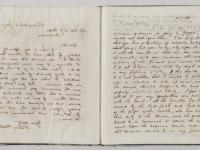Using the stories of Pierce Butler and Charles Ingersoll, students will examine the mixed political loyalties and uneasy bounds of free speech found in Philadelphia during the Civil War. Both men were native Philadelphians, but their esteemed families carried both strong political and financial connections to the South. Their experiences during the American Civil War will challenge students to think about the lines that exist between patriotism, criticism, and treason, and whether certain types of speech should not be protected by the law.
Trespass, Assault and Battery, and False Imprisonment: The Cases of Pierce Butler and Charles Ingersoll
Trespass, Assault and Battery, and False Imprisonment: The Cases of Pierce Butler and Charles Ingersoll
Essential Questions
Objectives
- Students will understand the factors that led to US citizens being charged with treason.
- Students will use critical thinking to analyze the legality of arrests and imprisonments during the Civil War.
- Students will be able to explain the divisions in the Democratic Party leading up to and during the Civil War.
Primary Sources
Other Materials
- Copy of the United States Constitution
- "Pierce Butler and Charles Ingersoll" by Michael Karpyn
Pierce Butler
- Sarah Wister’s Diary, April to August 1861 from "Sarah Wister Butler’s Civil War Diary" edited by Fanny Kemble Wister and published in the Pennsylvania Magazine of History and Biography, Vol 102, No. 3 (July 1978).
- “Arrest of Pierce Butler” from The Philadelphia Inquirer, August 20, 1861
- The War of the Rebellion: a Compilation of the Official Records of the Union and Confederate Armies, , Series II Vol.II, p. 505-509 “The Case of Pierce Butler” from Cornell University Library’s “Making of America” website
Charles Ingersoll
- Excerpts from the Sidney George Fisher diary from Nicholas B. Wainwright’s A Philadelphia Perspective: The Diary of Sydney George Fisher (Philadelphia: Historical Society of Pennsylvania, 1967).
- Charles Ingersoll, “A Letter to a Friend in a Slave State”
Suggested Instructional Procedures
1. Have students review the types of the speech that are protected by the Constitution, in addition to the rights of citizens accused of a crime.
2. Utilizing the sets of primary documents on Pierce Butler and Charles Ingersoll, have students determine the circumstances, reasons, and outcomes for their respective arrests. How would you characterize the speech and actions of each individual? Were their arrests reasonable or unnecessary actions? Do the included documents provide you with the impression that each of these individuals committed any type of crime?
3. Discuss the following with students
- What is the difference between speech that is “disloyal” and speech that is “treasonous?”
- Should any type of speech be restricted during war time?
- To what extent is it “patriotic” to express critical opinions of the government?
- Does the government have the right to hold a citizen without charges if they are suspected of committing a crime?
Vocabulary
Civil Liberties: the freedom of a citizen to exercise customary rights, as of speech or assembly, without unwarranted or arbitrary interference by the government. Writ: a formal order under seal, issued in the name of a sovereign, government, court, or other competent authority, enjoining the officer or other person to whom it is issued or addressed to do or refrain from some specified act.
Habeas Corpus: legal actions determining if detention is lawful
Tribunal: A court of justice
Conscription: a compulsory contribution of money to a government during a time of war.
Despot: a king or other ruler with absolute, unlimited power; autocrat, tyrant, or oppressor.
Plans in this Unit
Grade Level
Duration
Standards/Eligible Content
About the Author
This lesson was created by Michael Karpyn. Updated for SAS by Casey B. Wernick and Alexandra Rospond, Education Interns, Historical Society of Pennsylvania.
Attention Teachers!
Let us know how you used this plan and be featured on our site! Submit your story here.

